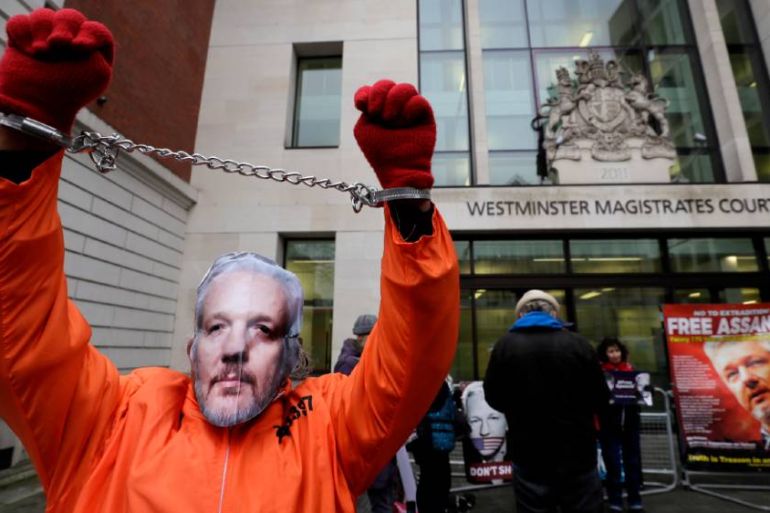UK judge warns against further delay in Assange extradition case
Jailed WikiLeaks founder’s extradition hearing to be split into two parts and could continue to mid-year.

A British judge warned against any further delay in hearing Julian Assange‘s fight against extradition to the United States on charges over the leak of classified documents.
The WikiLeaks founder’s full hearing is now likely to continue to mid-year after lawyers on both sides asked for it to be split into two parts.
Keep reading
list of 3 itemsMIA on Assange: ‘No one has fought for us the way he has’
Assange denied extradition hearing delay
District Judge Vanessa Baraitser agreed to the split, but told Westminster Magistrates’ Court in London she considered it a “lengthy delay” and added she was “unlikely to look favourably” on any further requests for dates to be moved.
The case will open as planned at Woolwich Crown Court on February 24 but will adjourn after one week and continue with a three-week hearing scheduled to begin on May 18.
A lawyer for the US government described the split as “sensible” and “necessary”, and Assange’s team agreed, saying more time was needed before their case would be ready.
|
|
Assange is awaiting the outcome of an extradition request by the US, where he faces 18 charges, including of conspiring to commit computer intrusion.
He is accused of working with former US army intelligence analyst Chelsea Manning to leak hundreds of thousands of classified documents.
Split hearings
Assange, who is being held at high-security prison Belmarsh, appeared via videolink on Thursday and spoke only to confirm his name and date of birth.
The 48-year-old wore a grey-brown suit and beige shirt with black trainers and appeared to be clean-shaven.
As with previous listings, supporters queued up outside the main building before it opened at 09:00 GMT and it was standing-room-only when court proceedings got under way.
Clair Dobbin, for the US, made the application for the hearing to be split, saying various legal issues would need to be ruled on after the case opened next month, including whether to allow some witnesses to be anonymous.
She said the US submitted a “substantial” affidavit to the court already but further defence evidence had since been served that needed to be responded to.
She also said the US team had experts – described as “extremely busy practitioners and academics with very full diaries” – who still needed to make their own assessments of Assange.
The US government’s main barrister in the case, James Lewis, was also involved in a trial in Northern Ireland that was of “a great deal of substance and importance”, rendering him unavailable for almost three months after the extradition case begins, Dobbin said.
More time needed
Edward Fitzgerald, a lawyer for Assange, said instructing solicitors continued to work “night and day” over Christmas, but indicated the legal team was still facing difficulties in getting access to their client in prison to discuss the case.
“We simply cannot get in as we require to see Mr Assange and to take his instruction,” Fitzgerald said. “Frankly, we require more time before calling the main body of our evidence.”
Assange, an Australian, was jailed for 50 weeks in May last year for breaching his bail conditions, after going into hiding in the Ecuadorian embassy in London to avoid extradition to Sweden over sex offence allegations, which he always denied.
Swedish authorities later dropped the rape investigation.
He has been in custody since he was dramatically removed from the embassy in April.
A further case management hearing will take place at Westminster Magistrates’ Court on February 19.